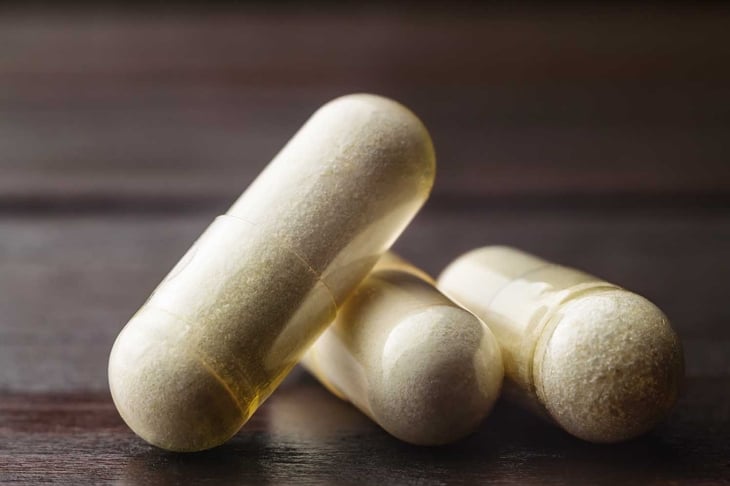What You Should Know About Glucosamine
There may be more to this popular supplement than you realize

You may have heard of glucosamine supplements being recommended for joint pain— but what is glucosamine exactly? While it exists in our bodies, scientists are still uncovering the full picture of this chemical. Read on for 10 important things that you should know about glucosamine.
Glucosamine is a sugar

Glucosamine is an amino sugar that is found throughout your body’s connective tissue, including the cartilage that cushions your joints. Your body uses glucosamine to make other chemicals that help build and repair tendons, ligaments, and cartilage, as well as synovial fluid—a thick fluid that lubricates your joints to keep them moving with ease. Glucosamine has been shown to have a range of beneficial characteristics, including antioxidant, anti-aging, neuroprotective, cardioprotective, and anti-cancer activity.
You can make it or take it

Produced naturally in your body, glucosamine can be found in animal bones, bone marrow, fungi, and the shells of shellfish. While it’s not commonly consumed in the human diet, supplements can be used in an effort to boost your body’s glucosamine content. Generally, glucosamine supplements are made with shells or can be formulated in a lab, and can come as capsules, powders, drops, and creams.
Choosing the right form is important

Glucosamine has different chemical forms, with those most commonly used in supplements being glucosamine sulfate and glucosamine hydrochloride. While different forms have similarities, they are not considered interchangeable and may behave differently within the body. For example, glucosamine hydrochloride has been found to be more easily absorbed by the body than glucosamine sulfate, meaning smaller doses of the hydrochloride form may be used compared to the sulfate form.
Supplement type is important too

Just as chemical form is important to consider, the form of a glucosamine supplement can also affect how the chemical works for your body. For example, when taken orally, glucosamine sulfate can be traced to cartilage in as little as four hours afterward. However, scientists are less certain that the chemical can be effectively absorbed into your body through your skin when taken in the form of topical glucosamine creams.
Glucosamine plays a role in brain health

Recent research has found that glucosamine could play a big role in brain function: Glucosamine makes up a large amount of the brain’s glycogen—sugars that your brain converts into energy. Scientists have found that your brain glycogen must balance glucose and glucosamine in order to stay healthy. The new discovery suggests that glucosamine could provide important insight into neurological diseases with further research.
It reduces inflammation

Glucosamine has been shown to offer anti-inflammatory effects, with numerous studies linking glucosamine to lower levels of chronic inflammation. Reducing levels of chronic inflammation can also reduce your risk of many diseases, including diabetes, heart disease, and arthritis. As a result, studies have shown that regularly taking glucosamine supplements can lower your risk of a range of chronic conditions. If you’d like to know more ways you can help reduce your risk of chronic inflammation, check out these 10 food swaps for sidestepping inflammation.
Glucosamine eases joint pain

While glucosamine helps keep your cartilage healthy, your body’s ability to produce it declines with age, leading to the breakdown of your joints. Studies show that glucosamine sulfate supplements can help counteract this breakdown, providing pain relief for those with osteoarthritis—especially in cases of osteoarthritis of the knees. Evidence suggests that, in some cases, after four to eight weeks of use, glucosamine sulfate supplements may even work as effectively as pain medications like ibuprofen or acetaminophen.
It supports bone health

In addition to joint health, research suggests that glucosamine supplements may also help to safeguard bone strength by supporting bone growth. As such, glucosamine supplements may be particularly useful for those at high risk for developing osteoporosis as they get older. Early studies indicate that glucosamine supplements could help prevent bone loss and the progression of osteoporosis in post-menopausal women.
Glucosamine has exciting potential

Outside of supporting joint and bone health, glucosamine supplements have been used with hopes of treating a number of other conditions, including inflammatory bowel disease (IBD), multiple sclerosis (MS), sports injuries, and aging skin. However, while more research is needed to prove glucosamine can be effectively used as a treatment for any of these conditions, science is still working to reveal the full picture of glucosamine’s role in our health.
Proper dose is up for discussion

While optimal doses of the different chemical forms of glucosamine have not been established, many studies use 1,500 mg of glucosamine sulfate per day—either taken as a single dose or broken up into three doses throughout the day. Be sure to consult your health care practitioner on what supplement type and dose is best for you.





